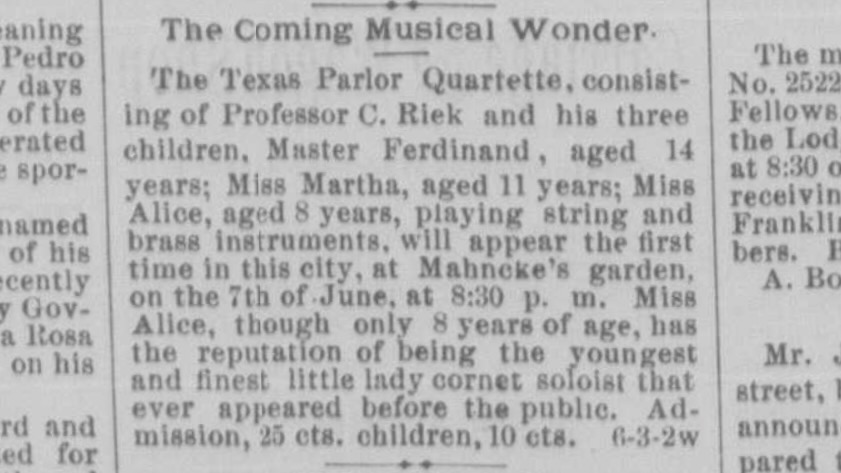
Constance Riek was 49 years of age in 1875 when he moved his family from Hermann, Missouri to Dallas, Texas. He had many accomplishments to his credit and was respected and loved by those who knew and worked with him. He had been a member of the Missouri Legislature and served as Judge in Gasconade County, Missouri.
Constance and his brothers served in the Federal Army during the War Between the States. Constance was a captain in the army as his father before him had been a captain and surgeon in the Prussian Army before immigrating to the United States. It was in 1842 Ernst Adolph Riek brought his wife, Martha, sons Constance, Charles, and August, and daughter, Elizabeth, to Hermann, Missouri, arriving July 3rd. The following day the musically talented family marched and played their instruments in the July 4th parade.
After the Civil War Constance and his brothers built a music hall in Hermann, Missouri. They booked the finest musicians of the day and gave concerts themselves. Constance taught music as well as performed. In his travels as a performer he met and married Helena Theobald in 1852, in New Orleans, Louisiana. She had come to America from Rheinheim, Germany.
Constance and Helena lost a number of children while trying to establish their family. When their daughters Annie and Julia were 19 and 17, son Ferdinand was 7 and daughters Martha 3 years and Alice an infant, the family moved to Dallas.
Professor Riek taught music as his children grew. His children were blessed with his musical talent and played many instruments. Each had a favorite; Ferdinand played the violin, Martha the piano and Alice the cornet. When Alice reached 7 years old, she joined her brother, sister and father, who played the clarinet, making up the “Texas Parlor Quartette” and performing locally. An April 14, 1884 article in The Dallas Herald praised the exceptional musical talent of the Riek family.
In 1885 Professor Riek took the “Texas Parlor Quartette” on the road, traveling and performing throughout Texas and Louisiana. Dallas remained their home, where Helena, wife and mother, divided her time traveling with the family and caring for their home at 115 Leonard Street. Within a year their travels took them further from Dallas; they entertained in large and small opera houses and music halls across the nation; playing in New Orleans, New York, Chicago, Cleveland, Washington D.C. and San Francisco, to name a few.
Professor Riek kept a detailed log, listing each city and music hall in which they performed, the rate of pay and where they stayed in the city. He noted when each child was requested to play an encore and even noted if one took sick. He had his own rating system for the places they stayed and there were always money orders to send home for mortgage payments. Reading this log gives insight into the man himself. He loved his wife and children, he loved his work. He respected his fellow man and was rarely let down by one of them.
After a couple of years, Professor Riek’s son, Ferdinand, left the family group to return to his Dallas home and continue his education. As a young man he organized an orchestra which gave concerts and played for dances and other social events. His orchestra played for some of the Idlewild Balls. He met and married Eugenia Long, the third daughter of former Dallas Mayor, Benjamin Long. His older sister, Annie, married George Hamm and Julia married a Mr. Cutler.
During this time, Ferdinand’s sisters, Martha and Alice, continued performing and became famous in their own right. The Riek Sisters were early recording artists, having recorded for Thomas Edison on his cylinder type recorder. Their travels brought them in and out of Dallas. They had been home only a few weeks after completing an engagement on the Pacific Coast when Professor Riek had a heart attack and died, December 28, 1893, at their home on Leonard Street. The Dallas Times Herald wrote, “Constance Riek was an eminent musician, being one of the most proficient clarinetists in the United States.”
By Mae E. Riek, Dallas
From Proud Heritage, Volume I by DCPA, currently out of print.
Get future posts by email.


